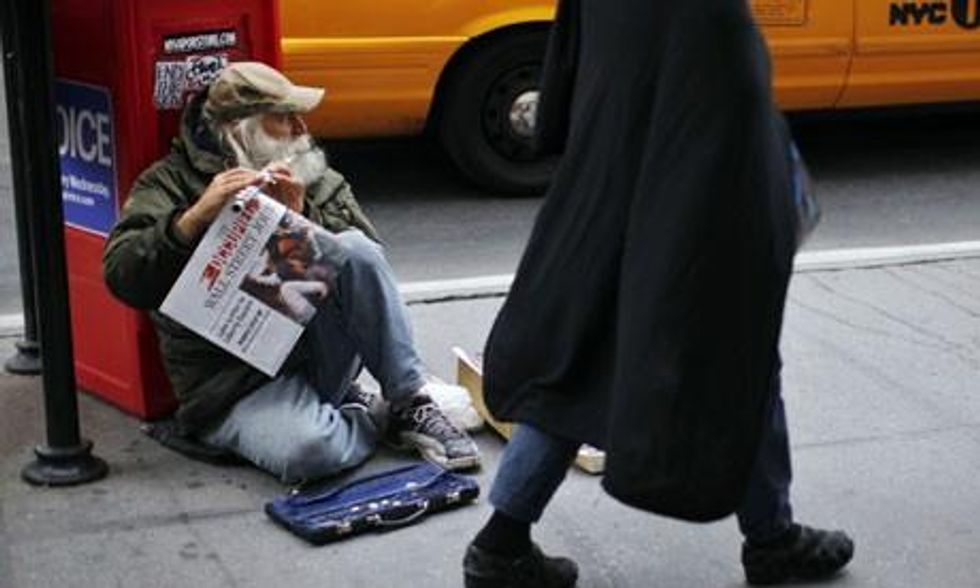With a compromise on social security now unmasked - costing the elderly an estimated 6.2-7.7%, according to business writer Doug Henwood - America becomes more and more a place of poverty. Warnings that austerity begets poverty will go ignored, but the nation's deteriorating condition cannot so easily be overlooked.
No surprise, in this milieu of victimizing the most marginal, that one anniversary has received far too little attention. This year, 2012, marked the 50th anniversary of a ground breaking book, The Other America, by Michael Harrington, a searing examination of rampant poverty in the richest nation on earth. A prominent review of Harrington's work in the New Yorker magazine, reportedly brought to the attention of then President John F Kennedy, ultimately helped influence the Great Society reforms later launched by his successor Lyndon B Johnson.
But half a century later, we seem to be back to square one in this country.
For the past two years, the nation's largest nurses' organization, National Nurses United, has promoted a program to spur revitalization of our economy to assist families in financial peril. Our campaign was largely spurred by an alarming spike in patients presenting in hospital emergency rooms and clinics across the country who are forced to choose between paying medical bills, their rent or mortgage or feeding their families.
The crisis nurses saw was not an aberration. By 2011, with the recent recession showing scant signs of abating, official US poverty figures had soared to nearly 50 million Americans. Some in the political arena tend to pigeonhole poverty by race, but this calamity crosses all lines of gender, geography, age, and ethnicity.
Last year, almost one in four children lived in a family that regularly had difficulty affording sufficient food, according to the US department of agriculture. On the other end of life, 8.3 million people over 60 in 2010 faced the threat of hunger, up 78% from a decade earlier - yet another reason to oppose the proposed fiscal cliff cuts in social security or Medicare.
Hunger and malnutrition, as nurses will attest, lead to a broad array of health problems, ranging from reduced immunity to disease or even organ failure. For children, poor nutrition can severely stunt cognitive development and growth. For adults and seniors, the consequences can include more chronic illnesses and shorter life spans.
Over 20 million Americans live in extreme poverty - with cash incomes as low as $10,000 a year for a family of four. Is it any wonder that the US has the third highest poverty rate out of 30 leading industrial nations?
The problem is exacerbated by decades of economic and political policies that have resulted in a massive shift of national wealth from working people to the corporate boardrooms and the yacht owners. One result: real wage growth for workers has stagnated for 30 years; median household income has steadily fallen since the Wall Street produced economic crash of 2008. Much of the limited job growth since then has been in the lowest wage sectors, primarily food service and retail.
Sadly, the issue remained almost as invisible on the 2012 campaign trail as it was when Harrington shocked the nation in 1962. But it is not a surprise to nurses who, every day, see the faces of poverty and the suffering of families left behind - even as corporate profits once again soar and the parties and good times are back on Wall Street.
With all the enormous wealth in our nation, we really can do something about poverty - as well as the overall economic morass that continues to plague not just the unemployed, or those working two or three jobs, and flipping hamburgers in Main Street towns and cities from coast to coast.
Nurses have a solution. Everyone deserves a good job at living wages, guaranteed healthcare for all based on patient need, not on ability to pay, and equal access to quality education. And now, with cuts to social security on the table, and despite the push by some politicians in Washington and many state capitals to enact more austerity programs on already hard-hit communities, there is a simple way to keep anti-poverty programs in place and pay for them.
A modest tax Wall Street on speculation, embodied in HR 6411, authored by Representative Keith Ellison, could generate up to $350bn every year, an amount that could save over 1.7m homes from foreclosure, or finance 9m new jobs at current average wage levels. Or it could fund the food plans of 24m families of four for a year, or lift all 3.8m female-headed households out of poverty for nearly a decade.
Increasingly, the "Other America" is becoming all of us. It is up to all of us to end this disgrace.


